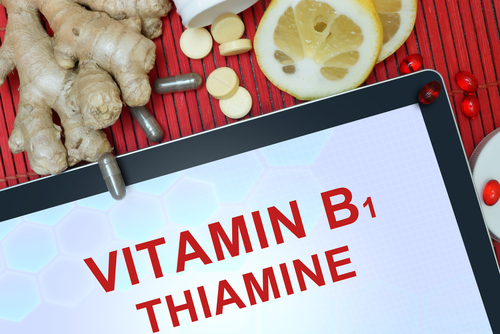Is Thiamine Bad For You?
Also Known As: thiamin, vitamin B1
Short answer
Thiamine isn’t bad for you, but not getting enough thiamine can be.
Very healthy and numerous health benefits. A few harmful qualities may be associated, but only under certain circumstances such as an allergic reaction.
View Full Grading System
Category 'A'
Very healthy and numerous health benefits. Side effects are rare. Things rated an 'A+' are typically necessary for survival (for example, water).
Very healthy and numerous health benefits. A few harmful qualities may be associated, but only under certain circumstances such as an allergic reaction.
Very healthy and numerous health benefits. Harmful qualities may be associated, but aren't usually serious.
It is important to note that even the best things in life can become bad in immoderate amounts. So, although something may be rated an 'A+', overconsumption/overdoing can bring unwanted effects.
Category 'B'
Very beneficial to your health. Things rated a 'B+' may have a few harmful qualities to pay attention to.
Overall beneficial to your health. Things rated a 'B' may have some harmful qualities to pay attention to.
More beneficial to your health than not. However, harmful qualities are most likely associated and shouldn't be overlooked.
The main difference between category 'A' and category 'B' is the harmful qualities typically present in 'B' items. Serious side effects are usually uncommon, but are still possible and should be taken note of.
Category 'C'
Both beneficial and harmful qualities associated. Things rated a 'C+' are typically a bit more on the beneficial side. Still, moderation is important.
A fairly even ratio of beneficial and harmful qualities. Moderation is important. Very general topics that can lean towards both sides of the spectrum will be placed here as well. Rice, for example, can be good or bad depending on the type.
More harmful than beneficial. Side effects are common, especially when consumed/done excessively. Moderation is very important.
Category 'C' usually denotes to both good and bad qualities. When it comes to this category, it is important to keep this word in mind: moderation.
Category 'D'
Harmful to your health. Although benefits may be associated, the bad most likely outweighs the good. Moderation is very important.
Harmful to your health. A few benefits may be associated, but the bad outweighs the good. Moderation is extremely important.
Harmful to your health. Very few, if any, benefits are present. Things in this category should be avoided as much as possible.
Category 'D' is typically for things that are more harmful than beneficial. While consuming/doing something unhealthy once in a blue moon shouldn't hurt, we definitely recommend eliminating 'D' items as a regular part of your routine/diet.
Category 'F'
Category 'F' is for things that fail to bring anything beneficial to the table, and are very harmful to your health. We recommend completely avoiding anything in this category. Long-term side effects of 'F' items are usually very serious.
Category 'N'
'N' stands for neutral. Things placed into this category are generally (a) neither good nor bad for you, or (b) lack the necessary evidence to reach any conclusions.
Long answer
Thiamine, or vitamin B1, is one of the B-complex vitamins. It helps the body to break down the carbohydrates you eat into glucose, which is then used to power your cells. B vitamins contribute to the health of several different parts of your body, as well: they help to maintain your skin, hair, liver, and eyes. Thiamine is also used to maintain a healthy brain and nervous system.
Your body needs B-complex vitamins like thiamine to function properly. If you don't get enough thiamine, you may become B-complex deficient. This might happen if you're not eating enough, if you're suffering from alcoholism, if you have Crohn's disease, or if your kidneys aren't functioning properly.
If your body doesn't have enough thiamine, then it can't break down carbohydrates into glucose properly. You might develop a disease called beriberi - you'll feel less alert and may feel confused. Fluid will slowly build up in your lungs, and you may have difficulty breathing. You might experience burning or tingling in your hands and feet. There's also a chance you may suffer from heart damage.
Too little thiamine can also cause problems with your brain and nervous system. You may experience memory loss and have trouble with muscle coordination. Although administration of thiamine can improve problems with muscle coordination, it usually doesn't restore memory.
There are some risks associated with taking thiamine as a supplement or injecting it as a treatment for thiamine deficiency. The B-complex vitamins work together, and taking too much of one without the others can cause problems. If you're taking thiamine supplements, make sure they're coming with other B-complex vitamins as well. The University of Maryland notes that extremely high doses of thiamine can upset your stomach; it's not toxic, however, and your body will excrete excess thiamine through your urine.
In rare cases, allergic reactions have been reported to some of the ingredients in thiamine supplements. If you're receiving thiamine by injection and have trouble breathing or experience itching or redness around the injection site, speak with your doctor.
Thiamine interacts with some medications. Digoxin is a heart medicine that may interfere with your body's ability to absorb thiamine. Diuretics may reduce your levels of thiamine. Phenytoin may also reduce your levels of thiamine. Check in with your doctor if you're taking any of these medicines.
Side effects of deficiency:
- Beriberi
- Brain or nervous system damage
Possible short-term side effects
- allergic reaction
-
interaction with medications
-
nausea if overconsumed
Commonly found in
Benefits
- promotes:
-
brain health
-
eye health
-
liver health
-
skin health
-
hair health
-
nervous system health
-
carbohydrate breakdown
-
energy production
Please turn your Ad Blocker off to see this content. Thank you!


 Approved by
Approved by 














